Is Your Geezer Showing?

Photo by Roland Kay-Smith on Unsplash
Call me crazy! Call me unkind? Call me unsympathetic! Call me insulting! Call me self-centered!
Just don’t call me illogical!
You can call me paranoid – because you would be right. Because I admit to a slight case of paranoia developed over the last decade-and-a-half or so.
I’m terrified that I might become a “geezer”!
You know what I’m referring to – that grumpy, immobile, smelly old fart that you swore you would never become.
Yes, that redundant, useless “elderly” that has been shuttled to the sidelines, park bench or nursing home by a youth-oriented culture that prefers we are out-of-sight – a society that largely resents us taking up space and using up valuable oxygen.
My paranoia is so real that four years ago I began penning a 45,000-word book by the same title: “Is Your Geezer Showing? Ten Steps To Not Becoming That Grumpy, Immobile, Smelly Old Fart That You Said You Would Never Become.”
The book is stuck in terminal edit mode. Some say I should pull the trigger and put it out there. Others say it’s too close to the bone and “unfriendly.”
Add those to a long, creative list of reasons for keeping it on my voluminous procrastination stack.
Maybe if you read the introduction, you could advise me as to whether or not you feel it should stay on the stack. Here it is:
I dread the thought of being called a “geezer”.
I’m grateful that, so far, it’s happened rarely in my life, usually in jest in a playful conversation with a group of similarly-aged friends, geezer candidates all.
But now, deep into my eighth decade, I have an increasing dread of hearing that moniker aimed at me, whether playfully or earnestly.
To be a geezer is not a destination that I want in my life.
Perhaps I’m overly self-conscious, paying too much attention to the external – the eye-bags, jowls, wrinkles, hair in the wrong places, turkey-neck, age-spots, persistent belt-overhang, ad infinitum.
Perhaps it’s resentment. I don’t need anyone’s help to remind me that the calendar is getting shorter.
Perhaps it’s because it’s an ageist term and I’m on a crusade against ageism.
Perhaps I’m feeling some guilt about having used the term, under my breath, on those occasions where an “elderly” is causing me some level of inconvenience – slow driver, holding up a line, etc.
Perhaps it’s because it strikes too close to home, forcing a face-off with the reality that I’m at a point, at the three-quarter century mark, where I could easily become one.
But most of all, I dread the term being directed at me because it means I may have demonstrated something that invited it. And that bothers me because it is something I have considerable control over.
This rather silly pre-occupation roused my curiosity about the origin of the word and how it came to carry such a derogatory meaning.
What is a geezer? What really defines a geezer? When does “geezerdom” start? What would it look like? What is it about me that would elicit this lovely term from someone?
How does one avoid becoming one?
That’s where I intend(ed) to go with the book.
A geezer definition
Merriam Webster defines a geezer as: “a queer, odd or eccentric person – especially of elderly men.”
Wikipedia says: “the term typically refers to a cranky old man.”
There, you see – just what I don’t want!
I did a very informal, unscientific poll of friends, family, and acquaintances to see how consistent other people’s descriptions of geezer are. Here’s a sample of their responses to the question “What do you think of when I say the word “geezer?”
“An old man that’s going nowhere. Not so much age-specific but attitude specific. My dad is 85 and not a geezer – very active, still working developing a mobile sawmill, hunts, and fishes, traps, involved in the community. Conversely, my aunt, his sister, ‘hunkered down’ early and has health problems as a result.” Fellow Toastmaster Club Member
“A guy, older, some hair, funny whiskers on his chin. Something you wouldn’t want to be. Not age specific –more of an attitude.” My wife (Note: I’m relieved she didn’t just say “You!”)
“Old guy bent over on a cane. Hook nose, warts, snarling.” Member of extended family
“A cross old man who sits on the porch and every other word is f*#@, drinking a cheap geezer beer in a sleeveless undershirt.” Name and relationship withheld for obvious reasons – I really don’t know this person!
I suspect you may have your own description – most likely not very uplifting either.
Age-ing to Sage-ing
I have Rabbi Zalman Schacter-Shalomi and Ronald S. Miller, co-authors of “From AGE-ING to SAGE-ING; A Revolutionary Approach to Growing Older” to thank for re-stimulating the latent geezer paranoia in me.
If you share even a modicum of my paranoia, you might consider plowing through this challenging but seminal book on becoming an “elder” instead of just “elderly”.
 Here’s a taste: by way of encouraging continued and deeper learning, the authors remind us that we seriously underutilize our brain capacity and that we can counteract the ravages of brain cell disintegration associated with ageing by increasing neural connections through meditation (pick your own form) and lifelong learning.
Here’s a taste: by way of encouraging continued and deeper learning, the authors remind us that we seriously underutilize our brain capacity and that we can counteract the ravages of brain cell disintegration associated with ageing by increasing neural connections through meditation (pick your own form) and lifelong learning.
Specifically, they say: “- – elders need to upgrade the number and range of programs that their brains are able to process. Without doing this, elders will continue to be devalued by society as a useless and redundant population.”
Ouch! See, there is more justification for my paranoia.
Pouring more fuel on the fire, the authors quote the head of a Sufi order in the West and a respected meditation person who says:
“If you don’t know that you can be a new person, you will continue dragging your old self-image into the brave new world. You will be outrun and pronounced redundant, unable to make a contribution to the inexorable advance of evolution on our planet.”
And then the paragraph that motivated this post:
“Who needs “old geezers” around if all they do is deplete the Social Security system and give back little to society? But if we honored elders for their moral and spiritual leadership, we would value this form of ‘invisible productivity’ as necessary for our survival.”
I guess I hadn’t really thought of my quest of encouraging “elderhood” instead of “elderly” as one of “invisible productivity” but I’m motivated by the term.
It’s a concept worthy of deeper understanding. Further into the book, the authors relate it to “holding the field” whereby we contribute to our “personal and collective well-being by growing beyond our current level of understanding”, recognize our inherent potential and accumulated wisdom and thus empower ourselves to pay forward and “hold the field” for those behind us.
That’s all kind of “anti-geezer”, don’t you think?
Maybe I should finish the book. I’m going back to see how much, if any, of it will help anybody “hold the field.” Perhaps I’ve been “invisibly productive” and not known it.
Your thoughts on the matter will be taken seriously. Leave them below.
I’ll let you know what I decide.




 Hello, I’m Gary Allen Foster, executive recruiter, retirement and career transition coach, writer, and speaker.
Hello, I’m Gary Allen Foster, executive recruiter, retirement and career transition coach, writer, and speaker. The move to “entrepreneurship” was exciting and exhilarating with its freedom and control – for about six months! Then reality hit!
The move to “entrepreneurship” was exciting and exhilarating with its freedom and control – for about six months! Then reality hit! None of this may be important to you. But I’m guessing if you’ve read this far, something is resonating. My thing is perhaps a quixotic mission of helping folks over 50 adopt a new perspective on how to finish strong, to finish with purpose, to live longer, live better and live with purpose, to be willing to reinvent themselves. In other words, to Make Aging Work and Live Big and Age Little.
None of this may be important to you. But I’m guessing if you’ve read this far, something is resonating. My thing is perhaps a quixotic mission of helping folks over 50 adopt a new perspective on how to finish strong, to finish with purpose, to live longer, live better and live with purpose, to be willing to reinvent themselves. In other words, to Make Aging Work and Live Big and Age Little. Shockingly, more than 50% of Boomers are financially unprepared to take traditional retirement. For those that can, 70% enter retirement with absolutely no non-financial retirement plan.
Shockingly, more than 50% of Boomers are financially unprepared to take traditional retirement. For those that can, 70% enter retirement with absolutely no non-financial retirement plan.

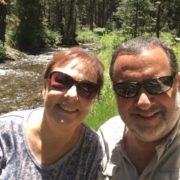
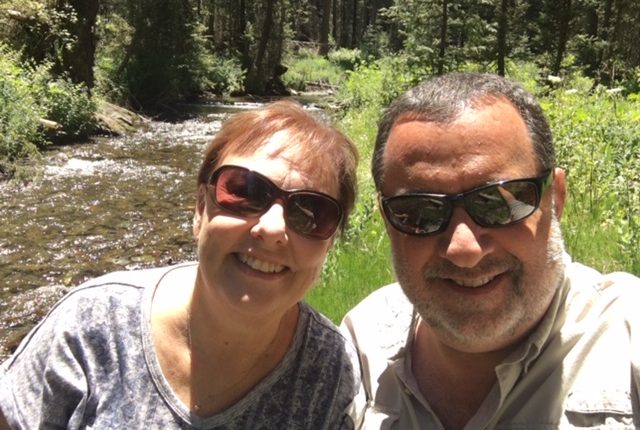


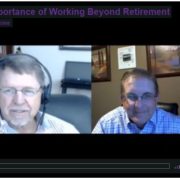
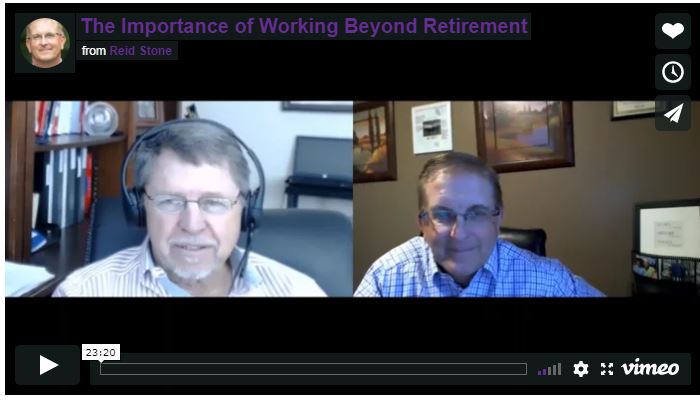

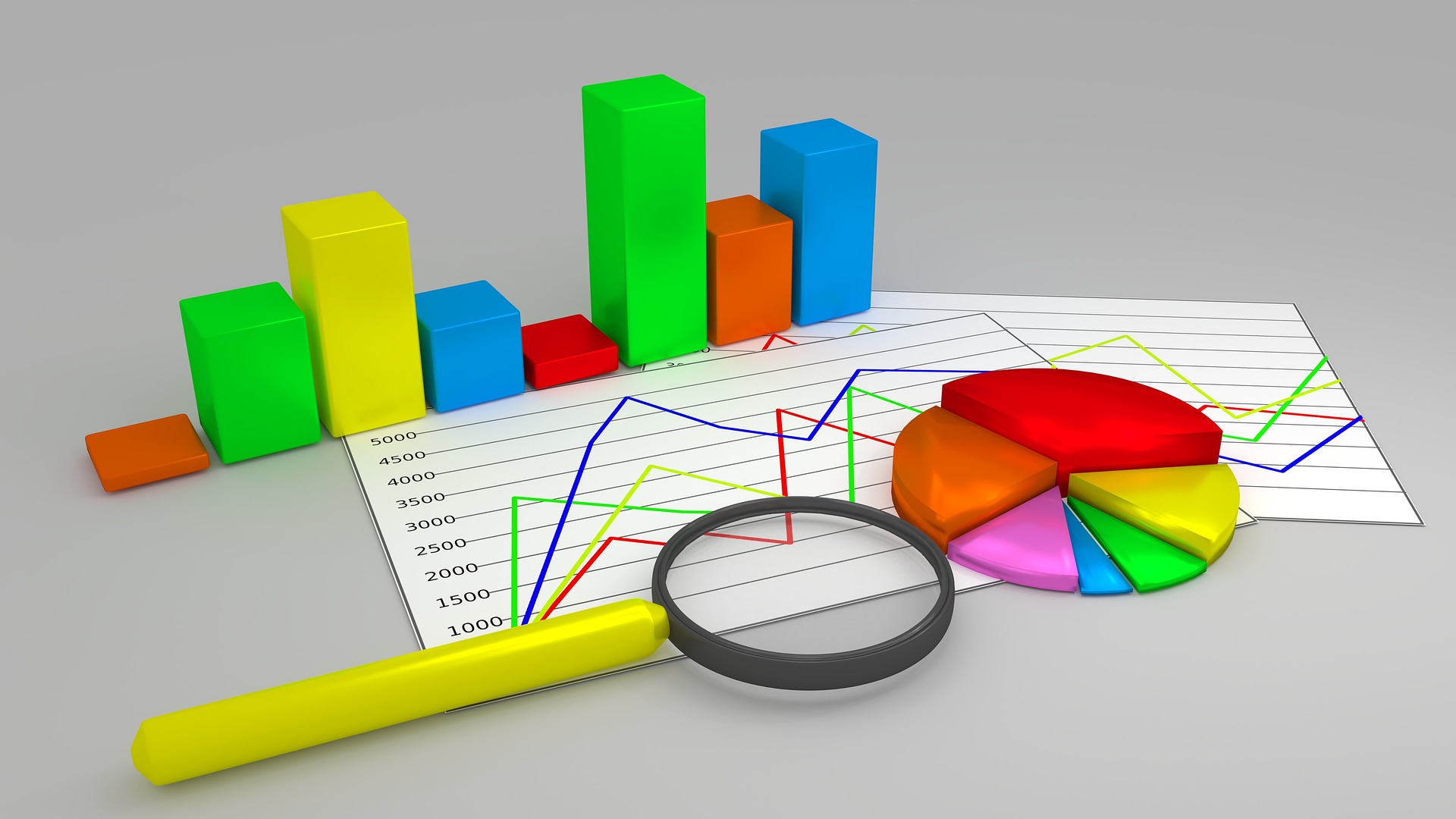


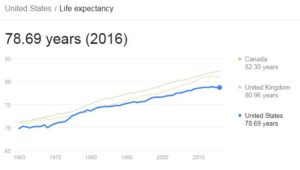
 If I don’t look my age, which I don’t, it’s not my genetics. If I don’t act my age, which I don’t, it’s about my beliefs. If I don’t feel 77 – well I can’t say what that’s about because I’ve never been 77 before. I just know I’m more energized, motivated and purposeful than at any other point in my life and I’m convinced my biology is listening and tagging along.
If I don’t look my age, which I don’t, it’s not my genetics. If I don’t act my age, which I don’t, it’s about my beliefs. If I don’t feel 77 – well I can’t say what that’s about because I’ve never been 77 before. I just know I’m more energized, motivated and purposeful than at any other point in my life and I’m convinced my biology is listening and tagging along.

 I’m sure that was a lot of information that you didn’t need/want to know.
I’m sure that was a lot of information that you didn’t need/want to know.
 That by itself is huge. But, with his new surge of energy and confidence, he has also begun to swing his diet to more of a plant-based diet.
That by itself is huge. But, with his new surge of energy and confidence, he has also begun to swing his diet to more of a plant-based diet.

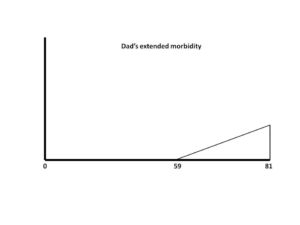
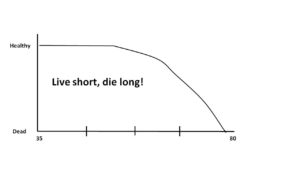
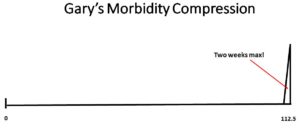
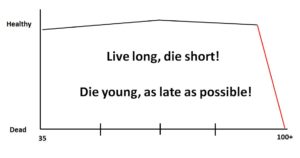

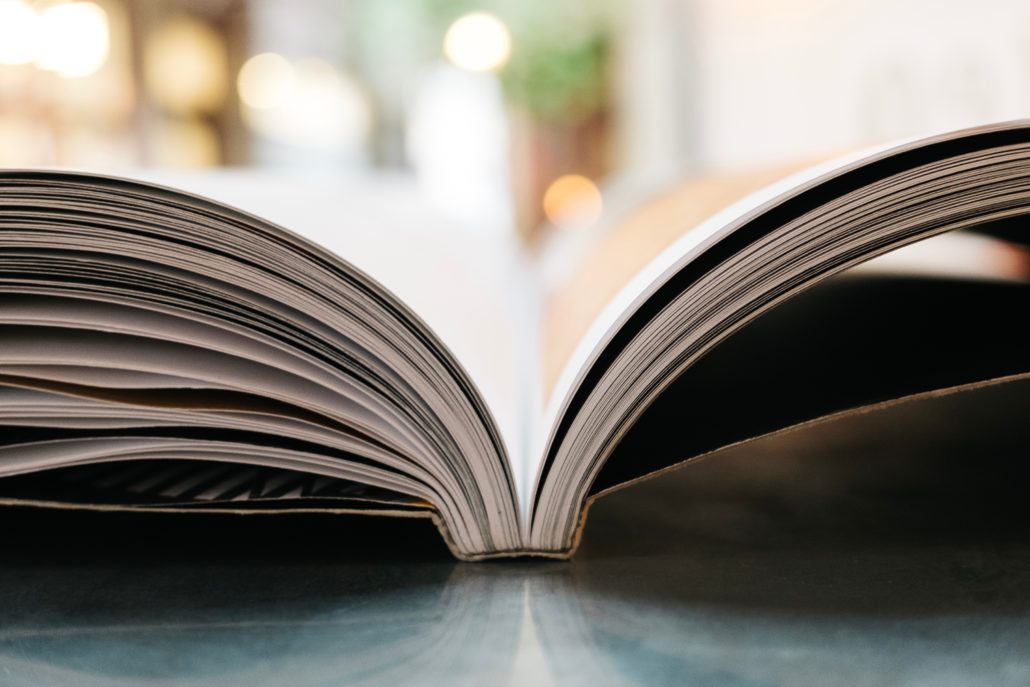
 Maybe we were smarter then and recognized that retirement is an unnatural act and doesn’t happen in nature. We’re the only species smart enough (???) to come up with the concept of intentionally going backward (look up the definition of retire) and planning it into our lives.
Maybe we were smarter then and recognized that retirement is an unnatural act and doesn’t happen in nature. We’re the only species smart enough (???) to come up with the concept of intentionally going backward (look up the definition of retire) and planning it into our lives.



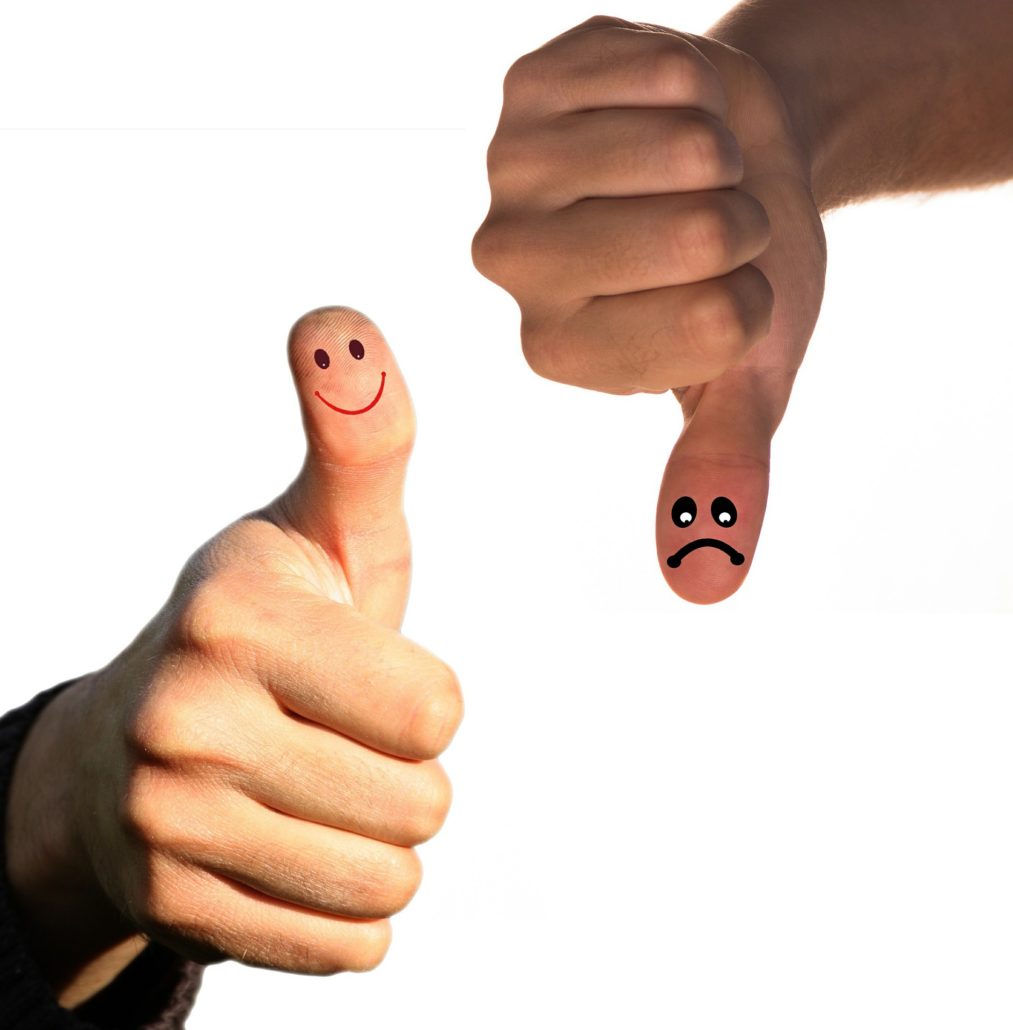

 One, our venture beyond middle-age today is putting us into unfamiliar territory. We haven’t been here before – living this much longer. One hundred years ago, we checked out around 50, mostly succumbing to what retired Stanford geriatric physician Dr. Walter Bortz refers to as “lightning events” i.e. infectious diseases, injuries/accidents, malignancies, poisonings, wars.
One, our venture beyond middle-age today is putting us into unfamiliar territory. We haven’t been here before – living this much longer. One hundred years ago, we checked out around 50, mostly succumbing to what retired Stanford geriatric physician Dr. Walter Bortz refers to as “lightning events” i.e. infectious diseases, injuries/accidents, malignancies, poisonings, wars.
 What I will rail against is off-the-cliff, labor-to-leisure, vocation-to-vacation retirement – the traditional model that emanated from a political decision in 1935, and that grew and became deeply embedded with the help of the financial services industry over the past 40-50 years.
What I will rail against is off-the-cliff, labor-to-leisure, vocation-to-vacation retirement – the traditional model that emanated from a political decision in 1935, and that grew and became deeply embedded with the help of the financial services industry over the past 40-50 years.